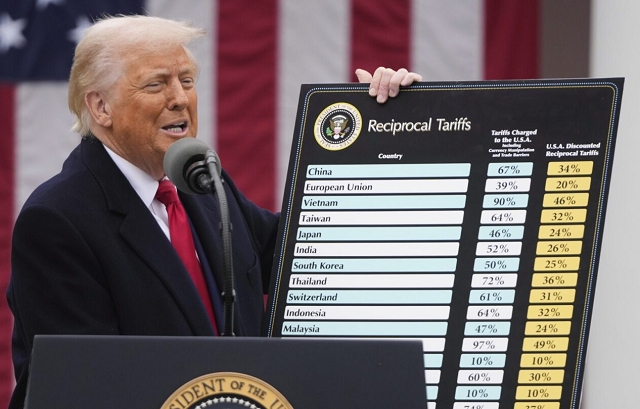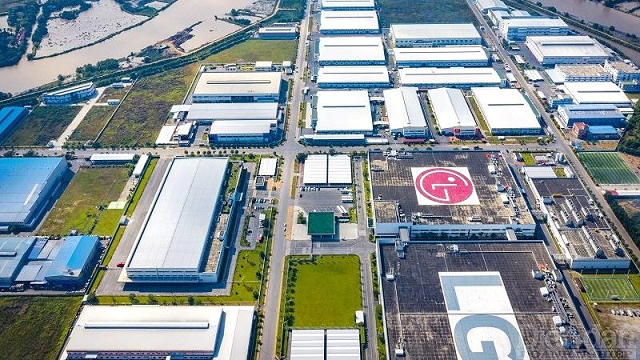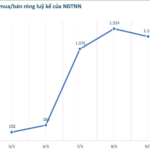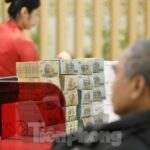
President Donald Trump announcing retaliatory tariffs on several countries, including Vietnam, in the White House Rose Garden on April 2, 2025
|
Just over a month ago, the majority of entrepreneurs and market participants in Vietnam were optimistic that the country would benefit if US-China trade tensions escalated. However, the high retaliatory tariffs of up to 46% (although temporarily postponed for 90 days) imposed by the Donald Trump administration on Vietnam have torn this rosy picture apart.
Immediately after the announcement of the new US tariff policy, a series of unfavorable developments took place in the stock market. Especially in the industrial park sector, stock prices fell across the board and remained at low levels. Becamex IDC (HOSE: BSM) – the developer of thousands of hectares of industrial parks – had to postpone a deal to sell 300 million shares, worth tens of thousands of billions of dong, due to the sudden negative turn in market conditions.
When the stock market fell sharply, no few corporate leaders – who had used shares as collateral for loans – were forced by securities companies to sell to settle debts, as in the case of Phat Dat (HOSE: PDR), Nam Viet (HOSE: ANV), and DIG.
The leading jewelry company, Phu Nhuan Jewelry Joint Stock Company (HOSE: PNJ), quickly added a plan to buy treasury stocks to the agenda of the General Meeting, in an effort to stabilize the value of the enterprise amid sensitive investor psychology.
But the problem doesn’t just lie in the fluctuation of enterprise value; it’s also about maintaining cash flow. In response, Hoa Phat canceled its plan to pay cash dividends to prepare for the risk of cash flow disruption. FPT, one of the leading information technology corporations, immediately required internal departments to cut 30% of all costs that do not directly generate revenue.
At the annual general meeting on the afternoon of April 15, FPT Deputy General Director Pham Minh Tuan raised the risk of a possible short-term decline in customer demand, as global companies become more cautious about new investments due to concerns about the health of the economy.
A sense of caution prevails among entrepreneurs, as the direction of important policies can change after just a few lines on President Trump’s social media.
Mr. Co Gia Tho, Chairman of Thien Long Group – a veteran leader in the consumer industry, admitted that it is difficult to fully assess the impact of the new tax policy from the US, but what he can assure is that doing business will become more difficult. The stationery company, with revenue of nearly VND3,800 billion, said it would be more cautious with its M&A plans in the coming time.
Meanwhile, FPT Chairman Truong Gia Binh shared at the annual general meeting: “We businessmen, today have to talk about the next three years, while policies can change overnight, how can we think ahead of time… Everyone I meet cannot say anything about the future.”

Vietnam is one of the countries that has benefited from the global supply chain shift in recent years
|
Textiles and Industrial Parks in the Eye of the Storm
One of the industries directly affected by the new tariff policy is textiles and garments.
With 30% of its export revenue coming from the US market, Thanh Cong Textile Garment Investment Trading Joint Stock Company (HOSE: TCM) is now accelerating production within 90 days to deliver goods before the new retaliatory tariffs take effect. Thanh Cong’s Chairman, Mr. Tran Nhu Tung, believes that opportunities may still arise as Chinese goods are heavily taxed, but everything remains uncertain until the trade negotiations between the US and other countries yield results.
In the long run, Mr. Tung opined that Vietnam’s garment industry can no longer compete based on low labor costs but needs to shift towards higher-value-added products through R&D, while promoting digital transformation in factories to increase efficiency.
Meanwhile, companies operating in the industrial park sector are significantly impacted.
D2D, the developer of industrial parks in Nhon Trach and Chau Duc, recently announced that a customer had requested to return the leased land, even though they had already paid 50% of the rent, due to concerns about the impact on their production plans.
On the other hand, some other units like Gilimex and Kinh Bac have not recorded any immediate negative impact but acknowledged that some investors have temporarily halted their projects to observe the situation. According to Kinh Bac, the biggest issue is that investors have to monitor the level of taxes that the US imposes on Vietnamese goods in relation to other countries in the region, before making long-term strategic decisions.

Mr. Nouriel Roubini is a renowned American-Iranian-Italian economist, born in 1958. He is known as ‘Dr. Doom’ for his gloomy economic forecasts, notably the prediction of the 2008 global financial crisis
|
In an interview with Bloomberg Television, renowned economist Nouriel Roubini argued that the volatility associated with tariffs increases uncertainty, thereby creating an expectation of “waiting”. Businesses will wait and see before deciding to invest, hire, etc., and consumers will also delay spending.
However, he argued that the problem does not just lie in uncertainty but also in the actual extent of damage caused by tariffs.
“If the US imposes a certain economic tariff on China, say 145%. That’s absolutely certain and there’s no uncertainty about it. We see that the economic impact at that point is very severe.”
“So, the argument that the problem is just about uncertainty, that ‘if we knew what they were going to do, everything would be fine’… is not correct,” said Roubini.
Thua Van
– 13:49 05/08/2025
“Cut Red Tape and Go Digital: Businesses Yearn for Streamlined, Efficient Administrative Procedures”
“On behalf of the business community, Mr. Tu Tien Phat, CEO of ACB, expressed at the seminar for contributing to Resolution 68, the strongest desire to vigorously promote administrative procedure reform towards simplicity, transparency, and comprehensive digitalization. This would provide a strong impetus for a robust recovery in production and business activities.”
The Day Deposit Rates Hit Rock Bottom: What Happened to the Banks?
In Q1 of this year, VPBank witnessed a significant surge in deposits, whereas Vietcombank experienced a slight downturn. Amidst rising credit, banks are exploring alternative means of capital mobilization.





















